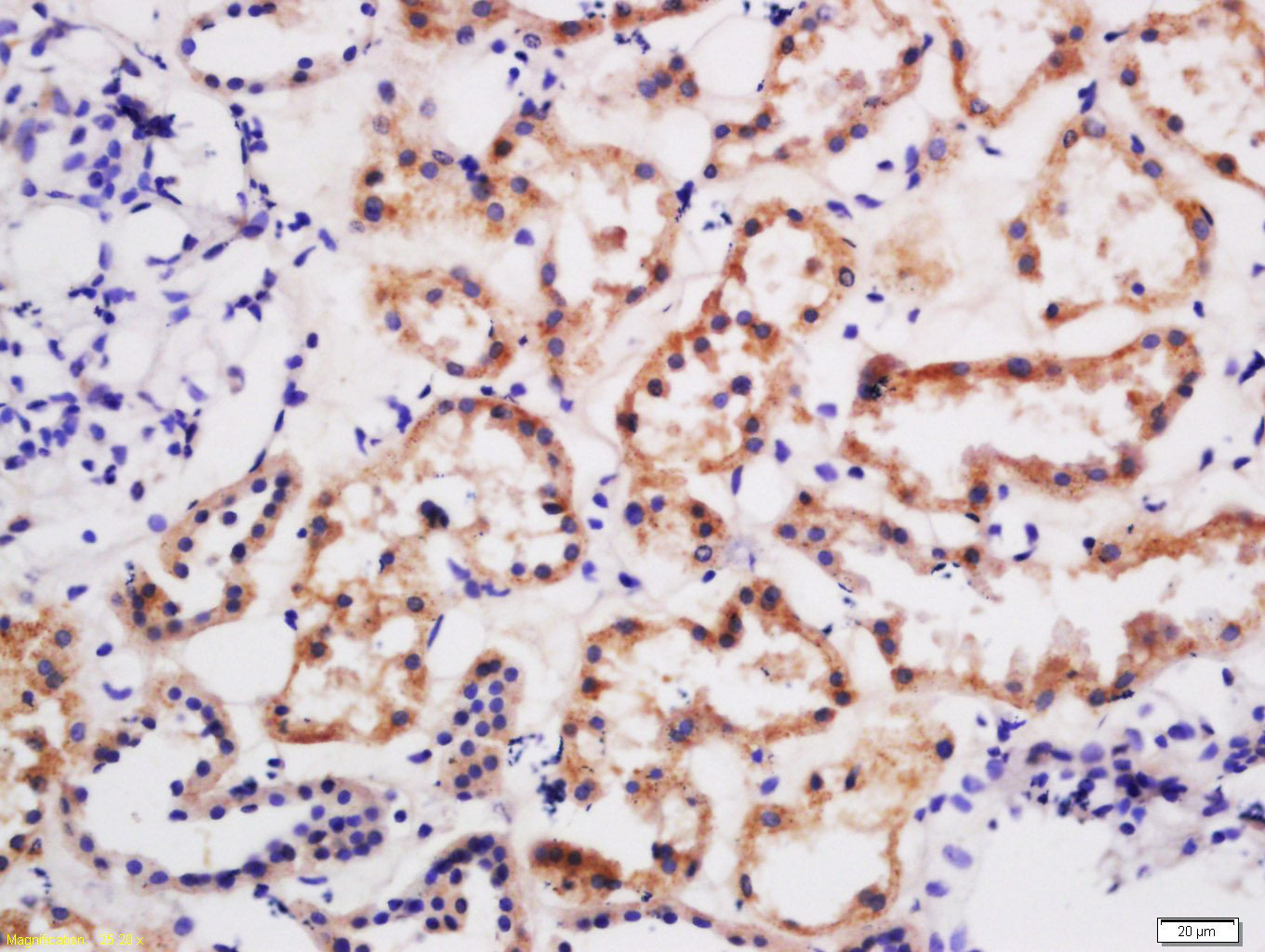
Rabbit Anti-BTR1 antibody
BT R1; NaBC1;SLC4A11;sodium bicarbonate transporter-like protein 11;solute carrier family 4 member 11; S4A11_HUMAN.
View History [Clear]
Details
Product Name BTR1 Chinese Name 钙粘蛋白相关蛋白受体BTR1抗体 Alias BT R1; NaBC1; SLC4A11; sodium bicarbonate transporter-like protein 11; solute carrier family 4 member 11; S4A11_HUMAN. literatures Research Area Cell biology immunology Signal transduction Immunogen Species Rabbit Clonality Polyclonal React Species Human, (predicted: Mouse, Rat, Chicken, Dog, Cow, Horse, Sheep, ) Applications ELISA=1:5000-10000 IHC-P=1:100-500 IHC-F=1:100-500 ICC=1:100-500 IF=1:100-500 (Paraffin sections need antigen repair)
not yet tested in other applications.
optimal dilutions/concentrations should be determined by the end user.Theoretical molecular weight 100kDa Cellular localization The cell membrane Form Liquid Concentration 1mg/ml immunogen KLH conjugated synthetic peptide derived from human BTR1: 751-850/891 Lsotype IgG Purification affinity purified by Protein A Buffer Solution 0.01M TBS(pH7.4) with 1% BSA, 0.03% Proclin300 and 50% Glycerol. Storage Shipped at 4℃. Store at -20 °C for one year. Avoid repeated freeze/thaw cycles. Attention This product as supplied is intended for research use only, not for use in human, therapeutic or diagnostic applications. PubMed PubMed Product Detail BtR1 is a cadherin receptor from the tobacco hornworm Manduca sexta.
Function:
Transporter which plays an important role in sodium-mediated fluid transport in different organs. Prevents severe morphological changes of the cornea caused by increased sodium chloride concentrations in the stroma. In the inner ear, is involved in transport of potassium through the fibrocyte layer to the stria vascularis and is essential for the generation of the endocochlear potential but not for regulation of potassium concentrations in the endolymph. In the kidney, is essential for urinary concentration, mediates a sodium flux into the thin descending limb of Henle loop to allow countercurrent multiplication by osmotic equilibration (By similarity). Involved in borate homeostasis. In the absence of borate, it functions as a Na(+) and OH(-)(H(+)) channel. In the presence of borate functions as an electrogenic Na(+) coupled borate cotransporter.
Subunit:
Homodimer.
Subcellular Location:
Cell membrane. Membrane; Multi-pass membrane protein.
Tissue Specificity:
Widely expressed. Highly expressed in kidney, testis, salivary gland, thyroid, trachea and corneal endothelium. Not detected in retina and lymphocytes.
Post-translational modifications:
Glycosylated.
DISEASE:
Corneal dystrophy and perceptive deafness (CDPD) [MIM:217400]: An ocular disease characterized by the association of corneal clouding with progressive perceptive hearing loss. Note=The disease is caused by mutations affecting the gene represented in this entry.
Corneal dystrophy, endothelial 2, autosomal recessive (CHED2) [MIM:217700]: A congenital corneal dystrophy characterized by thickening and opacification of the cornea, altered morphology of the endothelium, and secretion of an abnormal collagenous layer at the Descemet membrane. Note=The disease is caused by mutations affecting the gene represented in this entry.
Corneal dystrophy, Fuchs endothelial, 4 (FECD4) [MIM:613268]: A corneal disease caused by loss of endothelium of the central cornea. It is characterized by focal wart-like guttata that arise from Descemet membrane and develop in the central cornea, epithelial blisters, reduced vision and pain. Descemet membrane is thickened by abnormal collagenous deposition. Note=The disease is caused by mutations affecting the gene represented in this entry.
Similarity:
Belongs to the anion exchanger (TC 2.A.31) family.
SWISS:
Q8NBS3
Gene ID:
83959
Database links:Entrez Gene: 83959 Human
Entrez Gene: 269356 Mouse
Omim: 610206 Human
SwissProt: Q8NBS3 Human
SwissProt: A2AJN7 Mouse
Unigene: 105607 Human
Unigene: 441391 Mouse
Product Picture
Antigen retrieval: citrate buffer ( 0.01M, pH 6.0 ), Boiling bathing for 15min; Block endogenous peroxidase by 3% Hydrogen peroxide for 30min; Blocking buffer (normal goat serum,C-0005) at 37℃ for 20 min;
Incubation: Anti-BTR1 Polyclonal Antibody, Unconjugated(SL13714R) 1:200, overnight at 4°C, followed by conjugation to the secondary antibody(SP-0023) and DAB(C-0010) staining
References (0)
No References
Bought notes(bought amounts latest0)
No one bought this product
User Comment(Total0User Comment Num)
- No comment



 +86 571 56623320
+86 571 56623320
 +86 18668110335
+86 18668110335

